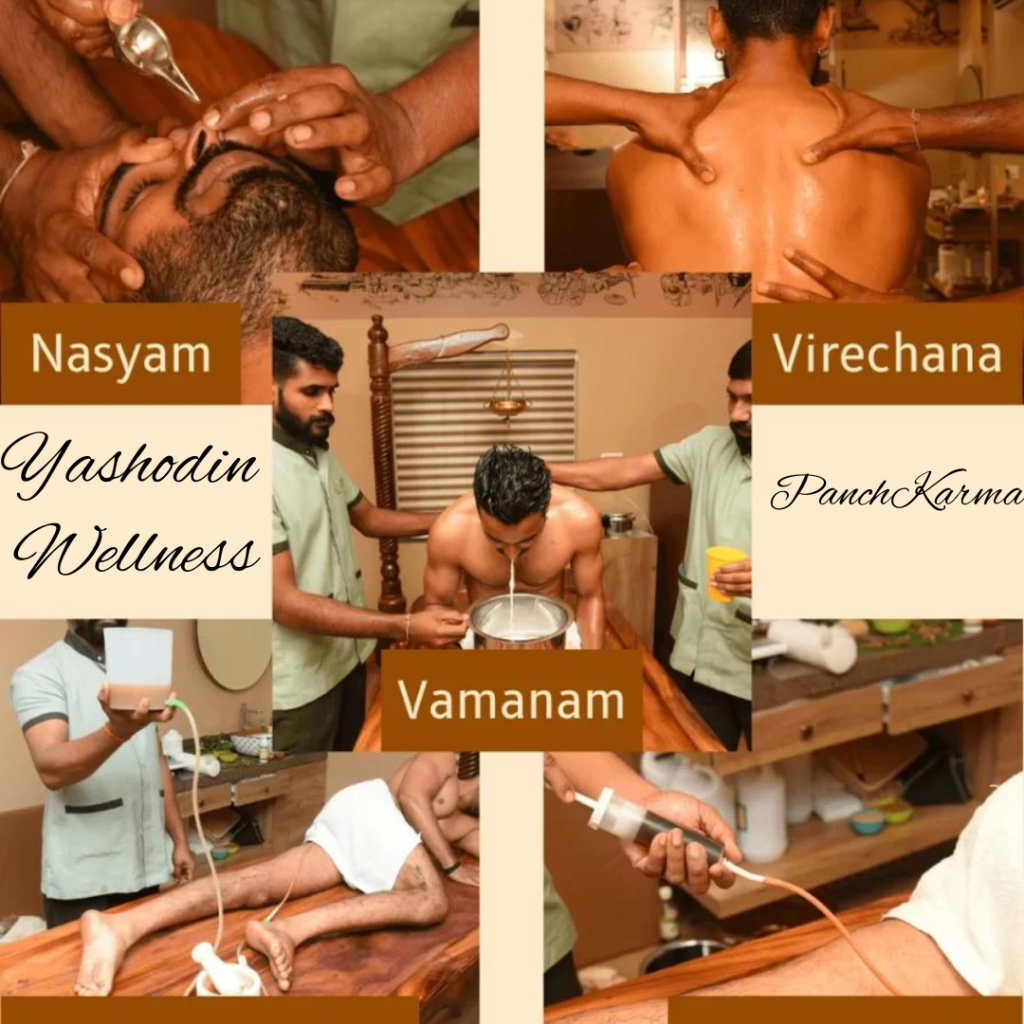Panchkarma Therapy

Panchakarma is a set of five therapeutic treatments in Ayurvedic medicine aimed at cleansing the body of toxins and restoring balance. “Panchakarma” translates to “five actions” or “five treatments” in Sanskrit. These treatments are designed to detoxify the body and rejuvenate it, improving overall health and well-being.
The Five Main Treatments of Panchakarma
- Vamana (Emesis Therapy):
- Purpose: To remove toxins from the body through therapeutic vomiting.
- Procedure: Patients are given herbal decoctions and medications to induce vomiting, effectively clearing the upper gastrointestinal tract and respiratory tract of toxins.
- Benefits: Useful in treating conditions like asthma, chronic allergies, skin disorders, and other Kapha-related diseases.
- Virechana (Purgation Therapy):
- Purpose: To cleanse the bowel and remove toxins from the liver and gallbladder.
- Procedure: Patients are administered purgative substances to induce bowel movements.
- Benefits: Effective for treating Pitta-related disorders such as skin diseases, jaundice, chronic fever, and digestive issues.
- Basti (Enema Therapy):
- Purpose: To cleanse the colon and remove toxins.
- Procedure: Herbal concoctions, oils, and decoctions are administered via enema.
- Benefits: Particularly beneficial for Vata-related disorders such as arthritis, constipation, neurological conditions, and muscle spasms.
- Nasya (Nasal Administration):
- Purpose: To clear and purify the head region.
- Procedure: Medicinal oils or powders are administered through the nostrils.
- Benefits: Effective for treating sinusitis, migraines, mental health issues, and respiratory problems.
- Raktamokshana (Bloodletting Therapy):
- Purpose: To remove toxins from the bloodstream.
- Procedure: Bloodletting is performed using various techniques such as leech therapy or venesection.
- Benefits: Helps in treating blood-related disorders, skin diseases, and chronic conditions where toxins have accumulated in the bloodstream.
Additional Therapies
Apart from these five main treatments, Panchakarma may also include supportive therapies like:
- Abhyanga (Massage Therapy): Full-body massage with medicated oils to nourish and rejuvenate the body.
- Shirodhara (Oil Drip Therapy): Pouring a stream of warm oil over the forehead to calm the mind and nervous system.
- Swedana (Herbal Steam Bath): Inducing sweat through steam to remove toxins from the skin and improve circulation.
- Pinda Sweda (Herbal Bolus Therapy): Application of warm herbal poultices to alleviate pain and inflammation.
Benefits of Panchakarma
- Detoxification: Cleanses the body of accumulated toxins and waste materials.
- Improved Digestion: Enhances the digestive fire (Agni) and promotes better absorption of nutrients.
- Boosted Immunity: Strengthens the immune system and helps the body fight against diseases.
- Enhanced Mental Clarity: Promotes mental clarity, reduces stress, and improves emotional well-being.
- Rejuvenation: Revitalizes the body and mind, promoting longevity and vitality.
- Balance of Doshas: Restores the balance of the three doshas (Vata, Pitta, Kapha) in the body, leading to better overall health.
- Skin Health: Improves skin texture and complexion by eliminating skin-related issues.
Preparation and Post-Care
- Preparation: Patients often undergo a preparatory phase called “Purvakarma,” which includes dietary adjustments, internal oleation (Snehana), and external oleation (Abhyanga).
- Post-Care: After Panchakarma, a period of rest and dietary guidelines are recommended to maintain the benefits and support the body’s natural healing processes.
Panchakarma should always be conducted under the supervision of a qualified Ayurvedic practitioner to ensure its safety and effectiveness tailored to an individual’s specific health condition.
Yashodin Wellness Solutions provides service of Panchkarma under the supervision of a qualified Ayurvedic practitioner at their clinics.
